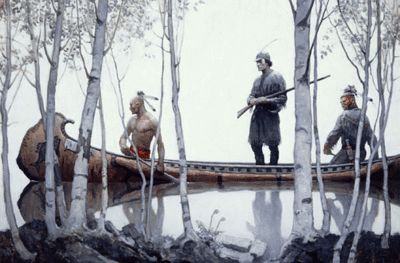« That Native American haircut | Main | The Glasgow train »
April 08, 2008
Natty Bumppo
In 1826 James Fenimore Cooper called the main character in his novel The Last of the Mohicans, Natty Bumppo. In 1992 the producers of the film clearly decided it would be slightly less ridiculous to call him Nathaniel Poe.
The French, as you may remember, called him La Longue Carabine, after the gun, which Natty referred to as Killdeer. The English called him Hawkeye – after the surgeon in M.A.S.H. *
It is a memorable moral tale eschewing the dangers of drink and following the Victorian ideals of the Noble Savage. A story of true romance and adventure – boy meets girl, girl meets Native American, Native American tries to cut boy’s hair off.
It’s set in a time [1757] when the French were fighting the English for who got to keep Canada, and the shifting allegiances of the Native American Nations made the plot often difficult to follow.
Magua, a Huron who had been kicked out of his tribe for being drunk, is living with the Mohawks in upstate New York. He has kidnapped the English Colonel’s daughters because the Colonel has had him whipped for, well - drinking too much.
He is being chased by Chingachgook, the Next to the Last of the Mohicans, Uncas, the Last of the Mohicans and Daniel Day-Lewis. They, in turn, are being pursued by other Hurons, who, for their part, are being chased by the Oneidas, who are Iroquois and generally on the side of the English. The Delawares, who manage to be on both sides at once, chase everyone.
Now it turns out, in the real world, there weren’t any Mohicans after all. There were Mohawks from the Mohawk Valley, and there were Mohegans from Connecticut, and there were Mahicans from the Hudson River Valley. As with so many of these things is was due to a mistranslation by one Adriaen Block, a Dutch explorer and fur-trader, understandable given the circumstances, especially after a long flight.
There was an Uncas, he was a Mohegan, and was a guide for the English during the Pequot Wars of the early sixteenth century.
Well I’m glad we got that sorted out.
*it was the other way round of course.
Posted by john at April 8, 2008 09:01 PM
